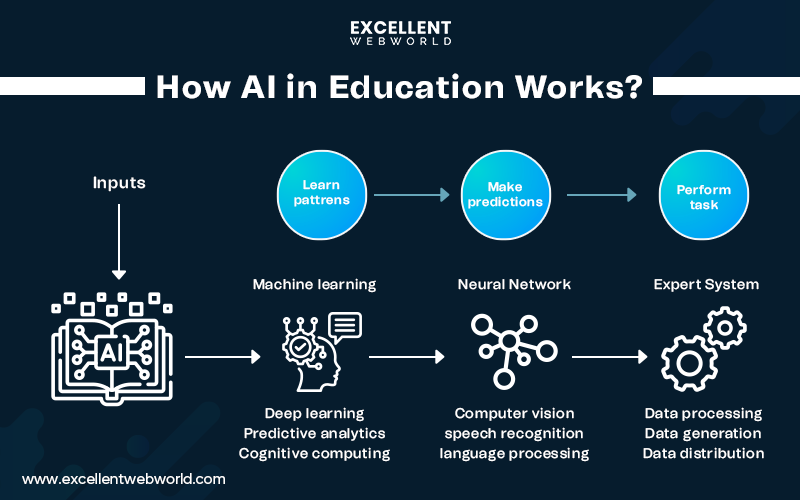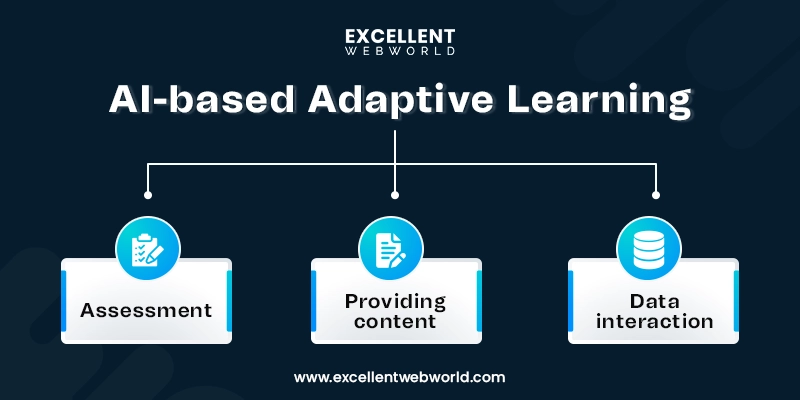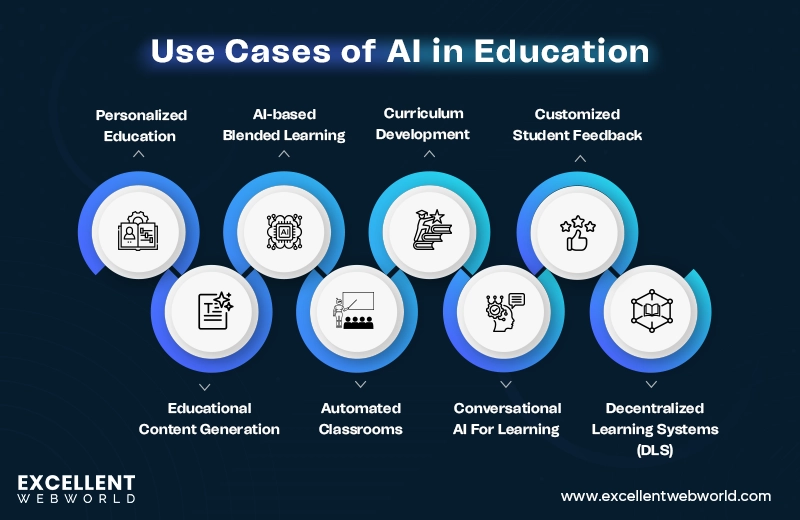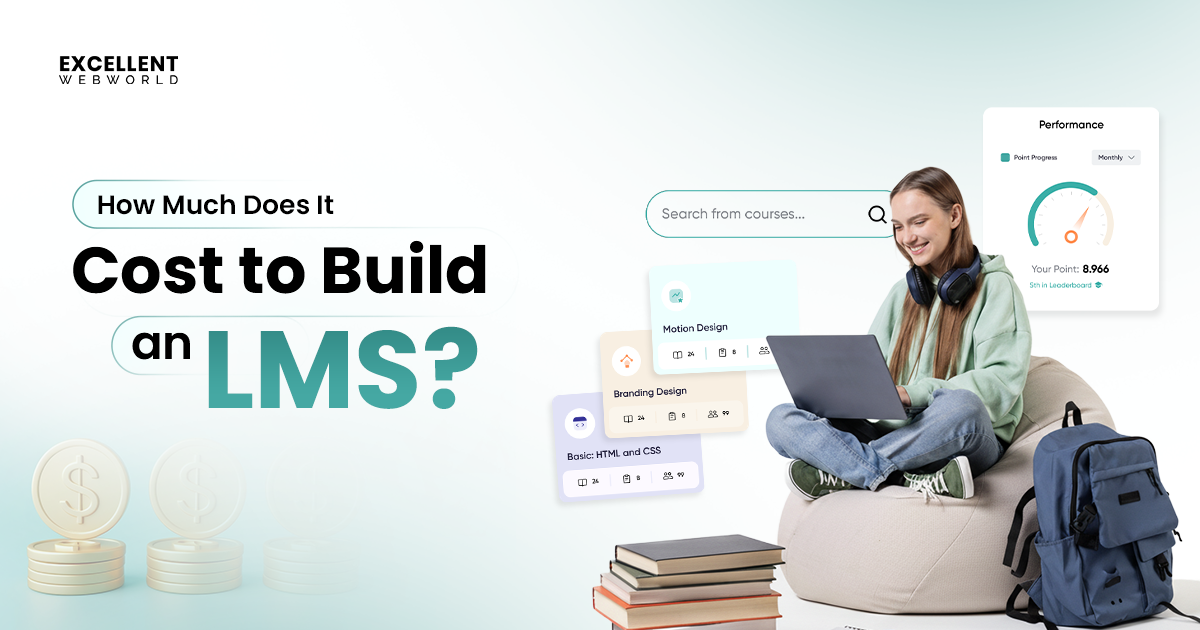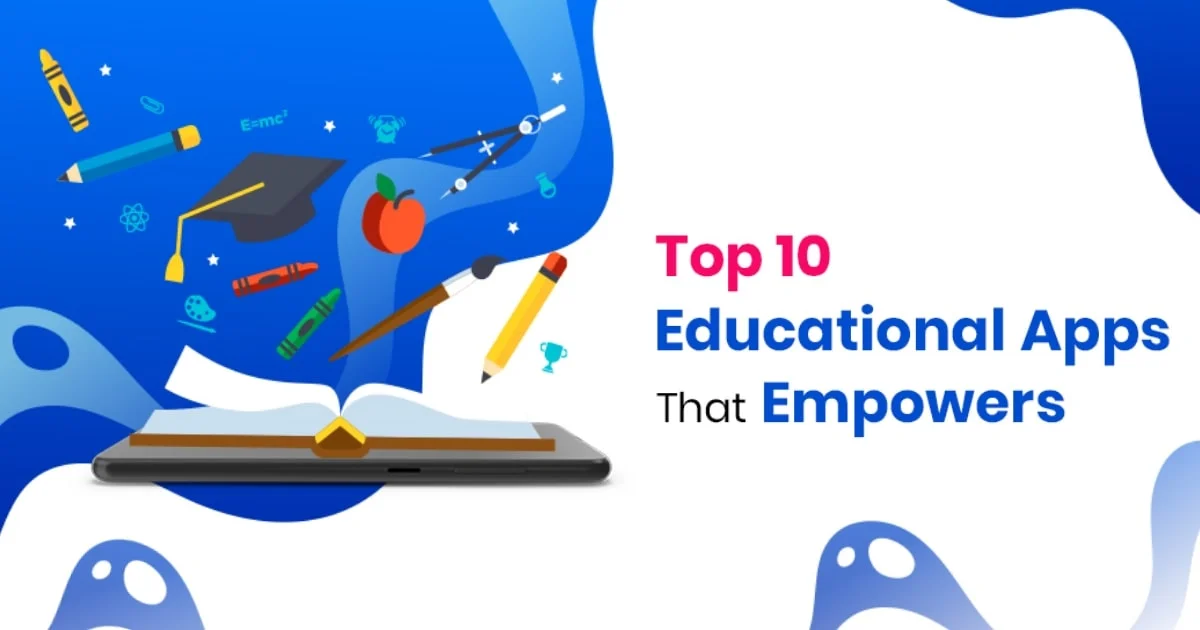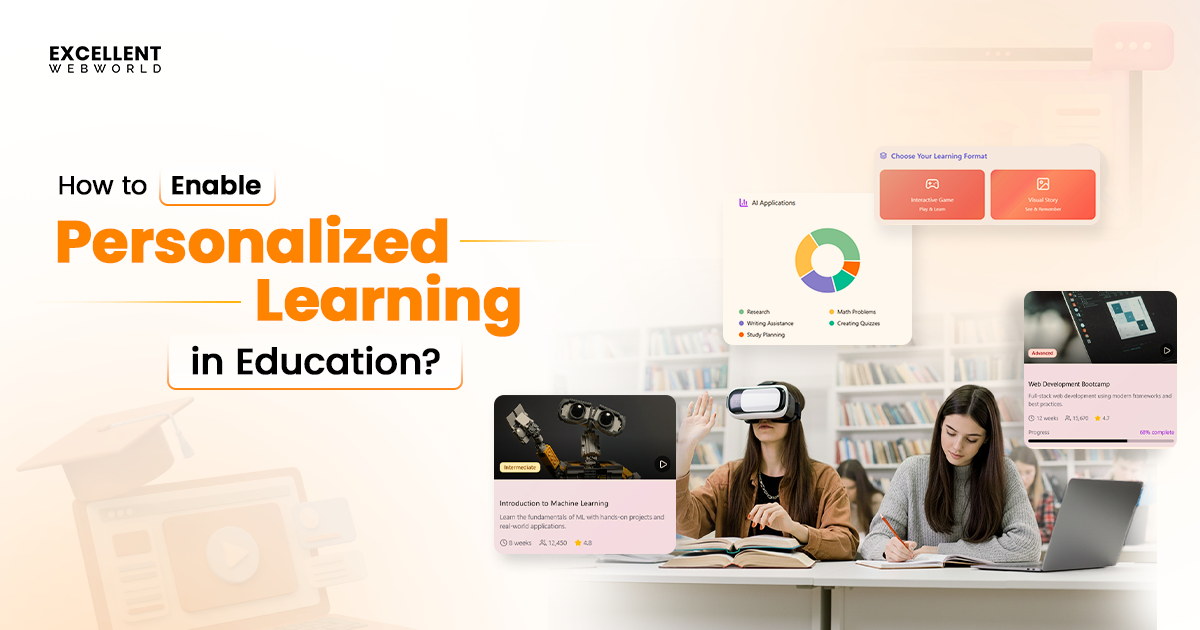Implementing AI in education is no longer a futuristic idea; it has become the biggest challenge solver in the industry.
Have you ever thought your school or edtech platform might be preparing students for a world that no longer exists? At its core, the education system is about preparing minds for the future. But the future is changing tremendously. And the adoption of artificial intelligence isn’t just a tech trend that came and will fade soon. It’s a fundamental transformation to how learning takes place, decisions are personalized, and outcomes are optimized.
Artificial intelligence in education is boosting systems with personalized teaching, multi-language and differential learning, automated content generation, and real-time assessments. All these AI advancements are not theoretical concepts; they are already in classrooms, apps, and campuses around the world. Entrepreneurs who embrace this shift early will define the next era of education. Those who delay risk becoming obsolete in a world where everybody demands intelligent, adaptive learning experiences.
At Excellent Webworld, we’ve successfully shipped over 900+ apps and software solutions, partnered with 600+ global brands across industries, and have adopted AI-first development as our core offering. With the help of our experts, we created this guide to understand how exactly AI is reshaping the learning experience and where you should start. Let’s break it down.
What is AI in Education?
Artificial intelligence in Education has several use cases, but first, you need to understand what AI is and how it can be used in the education sector.
Artificial intelligence (AI) refers to technologies that enable machines to simulate human intelligence. According to Google Cloud, AI is a technology suite that allows computers to perform advanced functions. These include seeing, understanding, and translating spoken or written language.
AI tries to replicate human intelligence digitally by leveraging data inputs to train models. Using machine learning models, AI learns data patterns. It uses data pattern analysis to make predictions and automate tasks.
How AI Can Be Used In Education?
AI tailors educational content to individual student needs through adaptive learning systems, while tools like conversational AI and speech recognition assist in language learning. Predictive analytics help identify students who need extra support, and advanced technologies such as AI-based AR/VR provide immersive experiences in subjects like science and math.
Evolution of AI in Learning
From early expert systems to today’s advanced generative AI, AI in education enhances tutoring, assessments, and content creation through deep learning and neural networks.
This is how AI has progressively influenced education, from simple rule-based systems to experienced, interactive, and adaptive tools.
How Is AI Impacting Different Educational Sectors?
AI has given the education sector a new identity, and learners’ perspectives have changed. AI has changed the education scenario, especially with personalized learning, student support, and automation of tasks for educators.
Here are some education sectors where AI has a high impact.
1. AI in Early Childhood Education
Early childhood education (ECE) is less explored than higher education. However, AI-powered toys and services provide students with an interactive and playful experience. They also help children learn and play with robotic kits. While there are many benefits to this approach, it’s important to consider the pros and cons of AI in education when evaluating its role in early childhood learning.
2. AI in Higher Education
AI is developing higher education across Edtech professionals, learning, research, and administrative domains. It offers opportunities to enhance efficiency and personalization and prepare students for a tech-driven future workforce. For example, AI in medical education is helping medical professionals improve their diagnostic skills with AI-powered simulations and personalized learning paths.
However, as with any technological advancement, there are also AI in education pros and cons to keep in mind, especially regarding the challenges associated with integrating AI into complex educational systems.
3. AI in Special Education
AI enhances the experience for students with disabilities in learning new skills and education. AI helps to match the pace of specific students’ learning speed. Enhance communication through AI-powered tools for students with disabilities. Robots for therapy for children with autism spectrum disorder (ASD).
However, the benefits of using artificial intelligence in education extend beyond learning ease.
What Are the Key Benefits of Implementing AI in Education?
Using AI in education, you can transform the overall learning experience of students, from learning to getting assessed and evaluated. AI can also help students self-assess, not just on the evaluation side. Further, AI can help tutors personalize classes and courses.
Other key benefits of AI in education are:
1. Adaptive Learning & Personalization
Adaptability is essential in education to improve learning, and AI can help enhance adaptability in the EdTech industry. Integrating such features in your edtech app requires expertise.
You can improve the adaptability by identifying.
Let’s break down how artificial intelligence in education enables adaptivity into three steps.
2. Enhanced Student Engagement
You can improve student engagement through AI models. Use an AI-based chatbot, a virtual system, and gamify the platform. These functionalities will enhance the interactions with the course material, which is analyzed using AI algorithms. Based on the analysis, AI suggests course and study material recommendations.
Another key benefit of AI in education is improving student learning patterns. AI algorithms frequently analyze the way students learn and recommend changes.
3. Intelligent Automation in Education
AI can help automate administrative tasks too, for edtech businesses. This includes scheduling student sessions, educator orientation, and course planning. Administrative tasks can also include the creation of content for different academic modules. AI helps find module gaps for edtech businesses and improves learning efficiency.
Automation feature development requires deep expertise in LLMs (large language models). An LLM is an AI model that understands and generates human tone. You can hire AI developers who understand the business logic and its goals to create custom AI models.
4. Cognitive Assistance & AI Tutoring
AI replicates the cognitive power of humans, which can help students and educators. For educators, AI can help automate course generation. Generative AI tools can help educators create engaging and personalized course materials.
At the same time, students can leverage cognitive computing to understand concepts. For example, students can easily understand engineering mechanisms using AI. It can blend visual and textual content to provide a holistic learning experience.
5. Predictive Analytics for Performance Optimization
Predictive analytics is one of the key benefits of artificial intelligence in education sector. Implementing AI in education can help you identify students who need more support in the class. AI models analyze academic performance, attendance, and socioeconomic conditions.
This analysis allows AI models to provide smarter recommendations for edtech businesses. Such recommendations help improve student performance and educational results.
Now that you know the benefits of AI in education sector, here are some practical apps to consider.
What Are the Use Cases of AI in Education?
There are multiple applications of AI in education. As we helped our many clients develop the best with AI in education sector, our experts at Excellent Webworld helped us to list the best use cases. So, here are some of the critical AI use cases in education.
1. Personalized Learning with AI
Every learner has their own learning requirements. The current education system is not able to personalize for each student. The only approach teachers traditionally follow is interaction with a group of students. Contrary to this, AI application in education enables focusing on individuals and improving personalized learning. You can also blend AI with trending technologies like AR/VR to make it more engaging.
2. AI-Driven Educational Content Creation
Educational content requires constant improvements as technologies and innovations update frequently. Accommodating new approaches, knowledge, and innovations requires continuous changes.
Teaching outdated technologies like Logo or C will not help learners. Similarly, you need to update content across courses.
This is why using technology in education, especially AI, is crucial. For example, generative AI can help educators and educational organizations quickly generate content. You can build custom AI algorithms that analyze existing content, find gaps, and fine-tune courses. AI also allows researchers to create smart content to understand students better.
Here are some AI-enabled educational content generation types
3. AI-Enabled Blended Learning Models
Blended learning is an approach to blending traditional classrooms with virtual classes. AI in the education sector helps to improve this blend. It enhances collaboration, which affects continuous engagement.
Use cases of AI for education to offer blended learning:
4. AI-Powered Smart Classrooms
Automation is one of the major key benefits of AI in education for professionals. Teachers and researchers can automate critical tasks like summarizing lectures, providing essential resources, and more. This optimization is why more and more schools are opting to integrate AI. According to RAND research, 18% of K-12 teachers already use AI.
As the AI used in schools, most K-12 teachers of US educational institutions do teaching activities, leveraging virtual learning platforms. It also allows K-12 teachers to employ adaptive learning systems for students weekly basis. Such widespread adoption of AI in education will help improve classroom automation, making a teacher’s job much easier.
5. AI in Curriculum Development & Optimization
Teachers develop curriculum using AI based on the latest tech trends and innovation. This allows education professionals to ensure students learn with updated information. AI also helps analyze curriculum and student performance and suggest improvements.
AI models can design your course syllabus comprehensively. They can also provide recommendations on topic ideation and additional content for your courses.
6. Conversational AI for Student Engagement
Better communication creates better engagement, which you can achieve through conversational AI. There are many options for conversation through AI, from virtual assistants to AI chatbots. These AI services allow students to learn, ask questions, and self-evaluate.
Educators should consider the power of natural language processing (NLP), available 24/7 for students and providing instant support on demand.
7. AI-Based Student Performance & Feedback Systems
Student feedback is crucial for any educational institute. Your retention rate can be reduced if students are not engaged with your learning program. Student engagement is especially vital to digital edtech startups.
AI in educational institutes can track student engagement and gather custom feedback. You can customize the input by building custom AI models.
8. AI in Decentralized Learning Platforms
AI needs massive data to identify patterns and provide recommendations. Managing massive data and securing information becomes difficult for edtech startups. In such cases, working with a team offering end-to-end AI development services can help design scalable and secure platforms. This is where you can blend top tech trends like blockchain with AI to build a decentralized learning system (DLS). Understanding a use case is one thing, but applying it to your startup can be complex. So here are some examples of AI in education.
Which Case Studies Prove the Success of AI in Education?
You must have encountered artificial intelligence in education, such as Duolingo and Google, until now, but there are many other real-life case studies.
1. Thinkster Math—AI-Powered Personalized Math Learning
Thinkster Math implements AI to offer personalized math tutoring, tailoring lessons to individual student requirements. Using AI-driven assessments, the platform identifies strengths and areas for student improvement, enhancing learning efficiency. A case study highlights how a student’s confidence and math skills improved through instant feedback and engaging lessons.
Thinkster Math combines human interaction with AI to offer custom programs. This platform helps educators track how students learn step-by-step. It also gives students information on their academic performance and how to improve it.
2. Knewton Alta—Adaptive AI Learning for Higher Education
It’s an adaptive learning platform specified as AI in higher education. Knewton Alta helps educators identify gaps in student knowledge, recommend relevant course materials, and improve engagement. Creating an e-learning app with adaptive learning requires an SME (subject matter expert). Knewton Alta hires biology, math, and science SMEs for better higher education.
3. Khanmigo—AI Tutoring Assistant by Khan Academy
Khan Academy is among the top 10 educational apps for teachers and students. Khanmigo is an AI-based tutor from Khan Academy who helps students with enhanced learning. Khanmigo is a teaching assistant powered by the GPT-4 AI model and a library of courses from Khan Academy’s library.
Khanmigo operates as an AI chatbot integrated into the Khan Academy interface. It offers personalized assistance for students in math, reading, writing, computer science, and more.
4. Nuance—AI-Driven Speech Recognition for Educators
Nauance is an AI-based platform that enables tutors to reduce time by making short lesson plans. Students are using Nuance to create short summaries of the lessons to better understand and get a gist of the lecture. To create short lessons, Nuance uses a speech recognition approach, which makes it a unique AI in education. It allows transcribing up to 160 words per minute of lectures.
5. Duolingo—AI-Powered Language Learning & Personalized Education
Duolingo, a language-learning app, uses AI to personalize lessons based on users’ performance and progress. The AI adjusts difficulty levels, provides adaptive feedback, and enhances retention rates, making language learning more effective and engaging for millions of users worldwide.
These use cases will help you develop an educational app, but you need to understand the trends to fill the gaps that stand out in your app.
Read Also: How to Make Your Own Language App Like Duolingo?
What Are the Future AI Trends Set to Transform Education?
Educational institutes are leveraging the modern AI trends in education to deliver education in a visual and interactive form to students. But which are the top trends in education technology that will rule in the future? Let’s explore.
1. AI-Driven Adaptive Testing & Assessment
AI-driven adaptive testing offers personalized evaluation, adjusting content to each student’s ability in real-time. It provides real-time feedback, efficient data analysis, and scalable solutions, enhancing learning and reducing biases.
AI ensures objective evaluations while improving accessibility for diverse learners. However, privacy, security, and equity remain essential considerations.
2. AI-Powered Virtual Educators & Teaching Assistants
The popularity of virtual avatars is increasing, especially with the rise of metaverse avatars. However, with AI in education, professionals also leverage avatars. AI can help educators create avatars that interact virtually with students.
Florian Mosbock and Mathias Janko at WU Vienna (University of Economics and Business) have already implemented one such virtual campus. Teachers and educators can prompt the AI model to generate an avatar with virtual backgrounds.
Students and teachers can also add their video feed to the virtual space. The virtual lecture hall also has two whiteboards where teachers can project slides, quizzes, graphs, and more. Similarly, you can build virtual spaces blending AI with voice recognition, computer vision, and other technologies.
3. AR/VR & AI Integration for Immersive Learning
The blends of AR/VR with AI in education industry blur the lines between reality and the virtual world. Leveraging VR development services, you can offer interactive surroundings that make learning easier. Plus, AR development services can help you infuse learning exercises with more engagement. For example, Case Western Reserve University used HoloLens to provide AR/VR-based learning of human anatomy.
HoloLens uses a combination of cameras, microprocessors, and sensors to track user movements and adjust the holographic projections. Integrating AR/VR with AI technology in education changes the future scenario.
4. AI-Driven Personalized Teaching & Tutoring
A key trend that you can expect in the future using AI in education is personal teaching. This is evident from several comments on a Reddit post discussing the future of education in AI. Many users indicated they prefer a personal AI tutor available 24/7 to learn anything. One of the users also pointed out how a personal AI tutor can be a great advantage to learning a new language.
AI models can act as virtual teachers and provide personal teaching for students. Edtech startups can use AI in education by customizing models to generate virtual tutors. These tutors will understand how students learn specific topics and adjust accordingly, providing a holistic learning experience. AI usage in the education industry will surge with innovations. However, AI adoption in education has challenges you need to consider.
What Are the Key Challenges in Adopting AI in the Education Industry?
Innovations come with challenges; the same goes for AI, such as costs, skill shortages, privacy, etc.
1. High Implementation Costs & Infrastructure Limitations
AI adoption requires considerable investments in infrastructure and development activities. First, you must invest in the database infrastructure to handle the vast information. AI models need data to train, and if you build a custom model, the cost of database infrastructure will increase.
You also need to develop custom APIs to integrate AI in education. If you are a school, college, or any other educational institute, digitizing the entire teaching process will be required, which can lead to massive costs.
Even if you choose an existing large language model (LLM) to adopt generative AI for your edtech startup, the data management costs will be higher. Hiring a professional service provider is the best way to reduce the cost of AI integration. An expert generative AI development company can help optimize the cost of AI adoption by implementing best practices, agile approaches, and cloud-based integrations.
2. Skill Gaps & Need for AI Expertise in Education
Implementing artificial intelligence algorithms to automate tasks and provide personalized learning requires tech expertise. For example, each model needs extensive training, evaluation, and testing before deployment, which can be highly complex for a non-tech entrepreneur or educator.
Plus, you may need more skills in the market for professionals who are experts in AI development. A Salesforce survey indicates that 6 in 10 IT workers believe there needs to be more AI skills. So, you need to identify critical skill gaps for adopting AI. Further, you must invest in hiring new talent and training.
One possible solution to the skill gap issue is to outsource AI development. Using customized AI development services, you can create custom applications. This helps you provide better education to students without spending a fortune on hiring and training.
3. Student Data Privacy & Security Risks
Implementing the machine learning algorithms for your educational startup requires data. This can be students’ data on their academic performance, weaknesses, and strengths, as well as private data for each student.
Maintaining the privacy of student data is a significant concern when adopting AI. Educational institutions and startups need security policies to protect student information. Such policies restrict student data access to specific people within the organization. The ethical use of artificial intelligence in education is essential to ensure that student data is handled with the utmost responsibility, protecting both privacy and fairness.
You also need security mechanisms to ensure compliance with essential data regulation standards like GDPR, PCI DSS, etc. For example, if students buy courses on your platform, the financial transactions require user data. Make sure you have systems that comply with PCI DSS for financial transactions.
4. AI Bias, Ethical Risks & Misinformation
Artificial intelligence is infamous for hallucinating about specific queries. The data used for training such algorithms can be biased, corrupting information. Ensuring bias-free and accurate information is highly important if you are an edtech startup.
Avoiding bias and hallucinations can be challenging because AI technology in education is still evolving. The best way to prevent such issues with your AI adoption is to ensure high-quality data during training.
5. AI Integration & Teacher Training Challenges
Training your teachers for AI can be challenging on many fronts. The first and most significant challenge will be change management. When introducing new technologies, there is always resistance to change within any organization.
You also need to ensure teachers understand the usage of AI-based tools and processes. This can take both more time and money. One possible solution to this challenge is to gradually introduce technology within the organization.
What Makes Excellent Webworld the Right Partner for AI in Education?
The above article should have helped you understand the benefits of AI in education and how to integrate it. However, one critical aspect of this process is understanding the nuances of the edtech industry. That’s where Excellent Webworld comes in. Rated as the #1 AI development company, Excellent Webworld qualifies as the trusted partner in implementing AI in the education sector.
We have experience in providing AI app development services for education experts. Our team of experts has successfully developed high-performance AI education software that integrates advanced machine learning and AR/VR technologies. With more than 900 successful projects, our experts have catered to different client needs in the education industry.
We are a leading online education app development company that offers end-to-end development and integration for AI practices. Contact us now to learn more about our solutions.
FAQs
AI use in education enhances the learning experience by providing real-time feedback and personalized study recommendations. It will help students and educational institutions by automating sessions, course planning, and more.
AI will boost the pace of higher and special education by providing experiences with technologies like AR and VR. Adaptability and global collaboration will help to provide better education.
AI in education offers multiple benefits, including enhanced accessibility, personalization, and better student engagement. It also saves educational professionals time and resources.
AI helps you with numerous benefits in education, but depending entirely on AI it includes privacy risks, algorithmic bias, critical thinking, and a lack of human interaction.

Article By
Mahil Jasani began his career as a developer and progressed to become the COO of Excellent Webworld. He uses his technical experience to tackle any challenge that arises in any department, be it development, management, operations, or finance.

